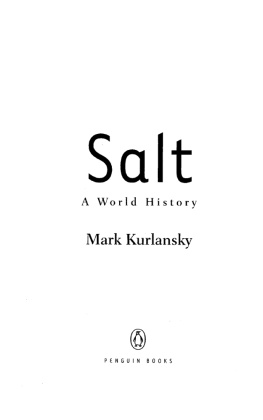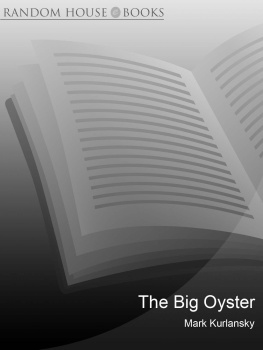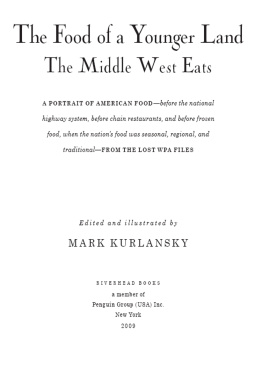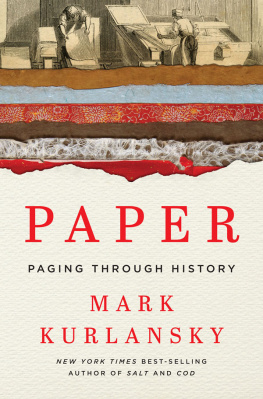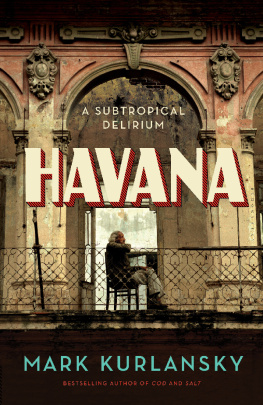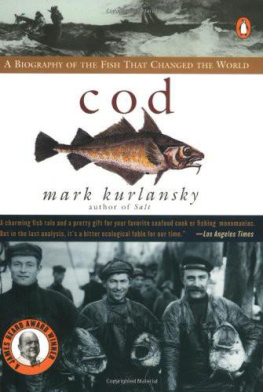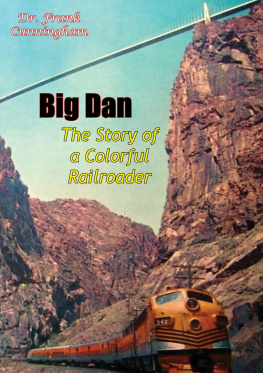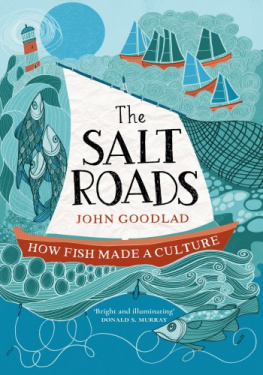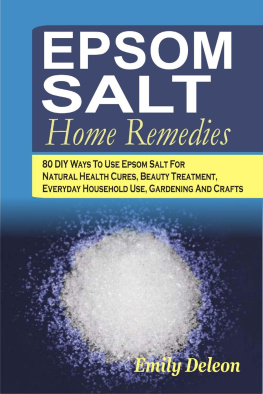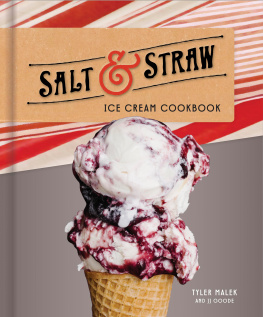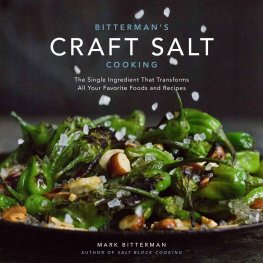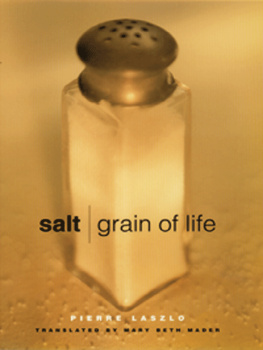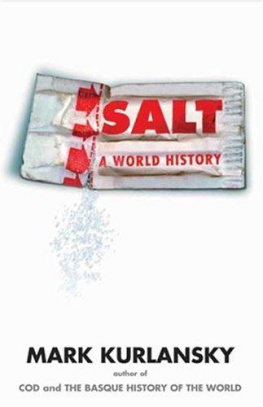PENGUIN BOOKS
SALT
Mark Kurlansky is the author of Cod: A Biography of the Fish That Changed the World, The Basque History of the World, A Continent of Islands: Searching for the Caribbean Destiny, A Chosen Few: The Resurrection of European Jewry, and the recent short story collection The White Man in the Tree. Cod received a James Beard Award for Excellence in Food Writing. Mr. Kurlansky lives in New York City with his wife and daughter.
Salt
A World History
Mark Kurlansky

PENGUIN BOOKS
Published by the Penguin Group
Penguin Group (USA) Inc., 375 Hudson Street, New York, New York 10014, U.S.A.
Penguin Group (Canada), 90 Eglinton Avenue East, Suite 700, Toronto, Ontario, Canada M4P 2Y3 (a division of Pearson Penguin Canada Inc.)
Penguin Books Ltd, 80 Strand, London WC2R 0RL, England
Penguin Ireland, 25 St Stephens Green, Dublin 2, Ireland (a division of Penguin Books Ltd)
Penguin Group (Australia), 250 Camberwell Road, Camberwell, Victoria 3124, Australia (a division of Pearson Australia Group Pty Ltd)
Penguin Books India Pvt Ltd, 11 Community Centre, Panchsheel Park, New Delhi 110 017, India
Penguin Group (NZ), 67 Apollo Drive, Rosedale, North Shore 0632, New Zealand (a division of Pearson New Zealand Ltd)
Penguin Books (South Africa) (Pty) Ltd, 24 Sturdee Avenue, Rosebank, Johannesburg 2196, South Africa
First published in the United States of America by
Walker Publishing Company, Inc. 2002
Reprinted by arrangement with Walker and Company
Published in Penguin Books 2003
Copyright Mark Kurlansky, 2002
All rights reserved
Illustrations on pages are by the author.
: Kenneth R. Mackenzies translation of Pan Tadeusz by Adam Mickiewicz used by permission of Hippocrene Books.
ISBN: 978-0-698-13915-2
CIP data available
Except in the United States of America, this book is sold subject to the condition that it shall not, by way of trade or otherwise, be lent, resold, hired out, or otherwise circulated without the publishers prior consent in any form of binding or cover other than that in which it is published and without a similar condition including this condition being imposed on the subsequent purchaser.
The scanning, uploading and distribution of this book via the Internet or via any other means without the permission of the publisher is illegal and punishable by law. Please purchase only authorized electronic editions, and do not participate in or encourage electronic piracy of copyrighted materials. Your support of the authors rights is appreciated.
Version_5
To my parents, Roslyn Solomon and Philip Mendel Kurlansky, who taught me to love books and music
and
to Talia Feiga, who opened worlds while she slept in the crook of my arm.
The real price of every thing, what every thing really costs to the man who wants to acquire it, is the toil and trouble of acquiring it.
Adam Smith, The Wealth of Nations, 1776
All our invention and progress seem to result in endowing material forces with intellectual life, and in stultifying human life into a material force.
Karl Marx, speech, 1856
Dreams are not so different from deeds as some may think. All the deeds of men are only dreams at first. And in the end, their deeds dissolve into dreams.
Theodor Herzl, Old New Land, 1902
INTRODUCTION

The Rock
I BOUGHT THE rock in Spanish Catalonia, in the rundown hillside mining town of Cardona. An irregular pink trapezoid with elongated, curved indentations etched on its surface by raindrops, it had an odd translucence and appeared to be a cross between rose quartz and soap. The resemblance to soap came from the fact that it dissolved in water and its edges were worn smooth like a used soap bar.
I paid too much for itnearly fifteen dollars. But it was, after all, despite a rosy blush of magnesium, almost pure salt, a piece of the famous salt mountain of Cardona. The various families that had occupied the castle atop the next mountain had garnered centuries of wealth from such rock.
I took it home and kept it on a windowsill. One day it got rained on, and white salt crystals started appearing on the pink. My rock was starting to look like salt, which would ruin its mystique. So I rinsed off the crystals with water. Then I spent fifteen minutes carefully patting the rock dry. By the next day it was sitting in a puddle of brine that had leached out of the rock. The sun hit the puddle of clear water. After a few hours, square white crystals began to appear in the puddle. Solar evaporation was turning brine into salt crystals.
For a while it seemed I had a magical stone that would perpetually produce brine puddles. Yet the rock never seemed to get smaller. Sometimes in dry weather it would appear to completely dry out, but on a humid day, a puddle would again appear under it. I decided I could dry out the rock by baking it in a small toaster oven. Within a half hour white stalactites were drooping from the toaster grill. I left the rock on a steel radiator cover, but the brine threatened to corrode the metal. So I transferred it to a small copper tray. A green crust formed on the bottom, and when I rubbed off the discoloration, I found the copper had been polished.
My rock lived by its own rules. When friends stopped by, I told them the rock was salt, and they would delicately lick a corner and verify that it tasted just like salt.
Those who think a fascination with salt is a bizarre obsession have simply never owned a rock like this.

A MONG THE PEOPLE who have apparently lived with such deprivation was the Welsh Jungian psychologist Ernest Jones, friend of Sigmund Freud and a leading force in bringing psychoanalysis to Britain and the United States. In 1912, Jones published an essay about the human obsession with salta fixation that he found irrational and subconsciously sexual. To support his theory, he cited the curious Abyssinian custom of presenting a piece of rock salt to a guest, who would then lick it.
Jones states that in all ages salt has been invested with a significance far exceeding that inherent in its natural properties, interesting and important as these are. Homer calls it a divine substance, Plato describes it as especially dear to the Gods, and we shall presently note the importance attached to it in religious ceremonies, covenants, and magical charms. That this should have been so in all parts of the world and in all times shows that we are dealing with a general human tendency and not with any local custom, circumstance or notion.
Salt, Jones argued, is often associated with fertility. This notion may have come from the observation that fish, living in the salty sea, have far more offspring than land-based animals. Ships carrying salt tended to be overrun by mice, and for centuries it was believed that mice could reproduce without sex, simply by being in salt.
The Romans, Jones pointed out, called a man in love salax, in a salted state, which is the origin of the word salacious. In the Pyrenees, bridal couples went to church with salt in their left pockets to guard against impotence. In some parts of France, only the groom carried salt, in others only the bride. In Germany, the brides shoes were sprinkled with salt.

